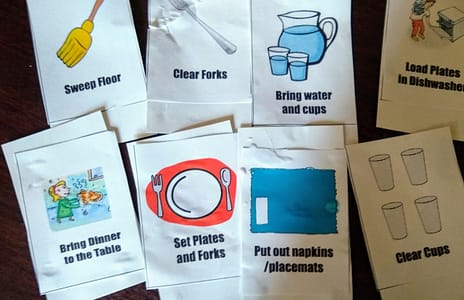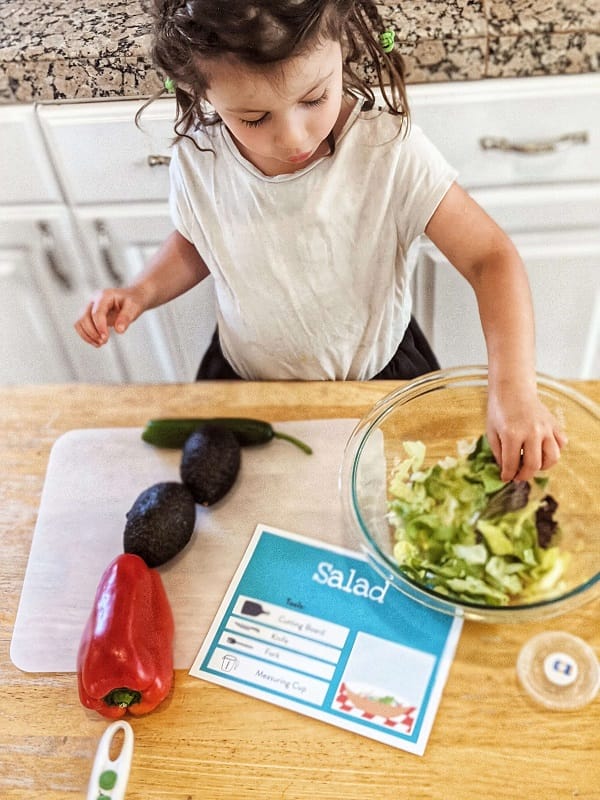Title of the List (Benefit, # of times, time frame)
Family dinner. It’s a prime opportunity to come together at the end of a long day. It’s a great place to introduce new foods to picky eaters and to demonstrate healthy eating habits. It’s also full of expectations, rules and well intended errors. Here are a few common dinnertime mistakes and how to fix them.
Mistake 1 - Doing it All by Yourself
If the whole family is eating, then the whole family should be involved. And not just in the cooking. Here’s a guide to getting your kids involved in mealtime.

Get the Kids Involved
The impact that chores have on children is well documented. Unfortunately, lessening the work of the adults in the family isn’t one of them. Instead, chores teach children responsibility, give them a sense of accomplishment and set them up to be successful adults.
3 Things to Keep in Mind...
Be Realistic
The most important part of having young children participate in household duties is to let go of perfect. Your dinner table might not be ready for a spread in Home and Garden magazine. You may need to vacuum over the floor to catch those elusive crumbs. It may take 10 minutes for a 6 year old to accomplish a task that you can complete in 1. Just take a deep breath and let go. Alternatively, find something else to do yourself.
Keep it Appropriate
The second task is to make sure that the jobs assigned to children are age appropriate. The 4 year old isn’t carrying a heavy pot of pasta. She can carry a bowl of salad. Keep your expectations high. If your 3 year old is capable of setting the table correctly, then expect that he does so. Being young isn’t an excuse. You can always do a demonstration and then patiently explain that all the place settings need to look like the example.
Celebrate your Success!
And reward a job well done. In our family, each member of the family gets a before and an after dinner job. When a person completes their job (correctly) we get a check. When the family reaches 20 checks, we celebrate together. This could be a trip to the ice cream store, or family movie night. The important thing is that no one is punished for not doing a chore. They simply aren’t rewarded. And it takes us longer to get to our prize.
See a step-by-step guide for creating your own dinner chore system.

Mistake 2 - Hoping for the Best
In order to be successful, first you have to plan. Here are a few simply ways to get yourself organized for making dinner.
Get your Mise Together
Mise en place is what separates the children from the adults in the kitchen.
- Do you find yourself running all over your kitchen, searching for ingredients in the middle of cooking?
- Do you start chopping your garlic after you’ve already heated your skillet to saute?
Have you ever gotten halfway through making dinner and then remembered that you need to buy more oil?Then you will benefit greatly from “mising” your stuff out. (Note: Mise is not a verb. It’s really a way of life.)
Mise en place translates to “everything in it’s place.” It really means make sure that you have everything ready to go BEFORE you start cooking.
- If you’re making a stir-fry, make sure that everything is already chopped and diced.
- If you’re making pancakes, measure out your ingredients BEFORE you start mixing.
- If you’re having cereal and milk, make sure you’ve got enough for everyone BEFORE you start pouring. (This also helps avoid fights over who got more/less)
One of the very best tips for making family dinner is: Mise it out. Once you have all of your ingredients measured and ready to go, cooking gets a whole lot easier.

Don't Wait Until Tomorrow
Life with kids gets crazy, so right now, I’m cooking rice. Do you have a recipe that calls for rice, pasta or beans? All of these can be cooking in advance. Hard boiled eggs? Cook those in the morning and serve them at dinner. Even the day before. If you know that you want beans for dinner tomorrow, then you can start cooking them now!
Don't Do Everything At Once
Overwhelm leads to inaction. Instead of looking at making dinner as one big task, try to break it up into smaller 5-10 minute tasks instead.
Cutting vegetables for a salad? You can do those in small 10 minute chunks, so at the end of the day, you just need to throw everything together in a bowl.
It’s not only food that you can prep in small doses. Do you need to wash some pots in order to make dinner? Did you leave last night’s pasta sauce in a pot in the fridge? Cleaning up your tools counts as prep. So while you’re washing up the breakfast dishes, clean out that pot for dinner. You’ll thank yourself later.
Mistake 3 - Having too Many (or too few) Rules
Parenting is a delicate balance between setting firm boundaries and allowing kids the freedom to make their own choices. Here’s how you can tell which type of parent you are at the dinner table.

Four Parenting Types at the Table
Authoritarian Parenting – These are the parents who rule with an iron first. At the table, these parents are the ones telling their children how much they need to eat. They may punish a child who doesn’t obey, for example by withholding dessert or by not allowing the child to leave until he’s cleared his plate.
Permissive Parenting – These parents don’t set strong boundaries for their children. At the table, these parents let their kids eat whatever they want. There are no rules enforced about when or where meals take place. These parents may also allow TV or screens at the table, unlimited access to junk food and little guidance on how to eat well.
Authoritative Parenting – These are the parents who create rules and explain them to their children. They are open to a discussion, but ultimately have the final say in decision-making. At the table, these parents provide healthy options, but don’t force children to eat. They explain clearly when and what is being served, but aren’t easily swayed by a screaming child.
Negligent Parents – This is what is sounds like – parents who don’t provide what their kids need. It’s a very serious situation and way beyond the scope of this blog.
Which One Should You Be?
Because Authoritative parents are highly responsive to their kids and also highly demanding, there’s a little bit of leeway here. For example. your child had a hard day at school and requests pizza for dinner. It’s ok to be more responsive than demanding and order a pizza. If your child spent the afternoon at a friend’s birthday party, then it’s also ok to be more demanding and insist that they either eat the healthy dinner you’re serving or not eat at all.
The important thing is to find the balance.
- Offer your child healthy food, served regularly and also know when to relax the rules a little.
- Pay attention to any mistakes you may make. Remember how we act is just as important as what we say.
- If you follow the division of responsibility for feeding, then chances are good that you’re creating a table of good role modeling, healthy choices and lots of respect.

Mistake 4 - Making it About the Food
Yes, it’s dinner. But it’s not really about the food. Here’s how you can stop focusing too much on what your kids are eating.
Stop Counting Your Kids' Bites
Yes, it’s extremely frustrating to spend time shopping and cooking for your family only to have them reject your meal. And it’s also normal to worry that your child has eaten too many cookies and not enough carrots.
One dinnertime mistake that parents often make is telling their kids to take more bites. Of course it’s coming from a place of love and concern. How will this little person ever become an adult if they don’t finish their broccoli? But forcing kids to take extra bites causes more harm that you might realize.
First of all, encouraging children to do things they don’t want to do already creates a power-struggle. This doesn’t mean that you kid should never brush their teeth or get to stay up as late as they want.
It means that parents need to really think about what’s worth battling over. Are those 3 bites of chicken really where you want to exert your authority? This also isn’t the atmosphere we want at the dinner table.
The second reason telling a child to eat more is problematic is that it sends the message that kids should not trust their internal signs of hunger. It’s confusing if they think they’re done, but you’re telling them they aren’t. Instead of worrying about how much they’re eating, you can worry about what you’re feeding them.
And if you’re feeding them healthy choices, then you really have nothing to worry about.

Stop Using Dessert as A Reward
Who doesn’t love dessert?Dessert is great and can really cover the spectrum from decadent chocolate cake to fresh fruit. And if your house is anything like mine, dessert is the one time that everyone comes to the table without complaining.
The mistake is when dessert becomes a reward.
As in “You can’t have dessert because you didn’t finish your dinner.”
It sounds great, especially if you have a kid who doesn’t eat dinner and only eats dessert. Why should they be able to eat dessert if they didn’t eat dinner yet?
Because dessert is not a reward for eating dinner. Being healthy, growing, having energy to play, those are rewards for eating dinner.
Dessert is an optional treat. If we treat dessert as a reward, then our kids will grow up believing that certain foods are earned. That’s actually a very difficult idea to unlearn and can lead to unhealthy eating habits down the road.
As for dessert, there are no prerequisites and it should be open to everyone. In fact, children who are denied foods grow up to over indulge. We want a healthy balance.
So offer dinner. Offer dessert, which you can definitely limit to 1 serving per person. Then relax knowing that your kids are learning to self-regulate!

Stop Stretching the Truth
Yes, we all want our kids to grow up healthy and happy, but that’s not enough of a reason to trick them. Many parents struggle to get their young children to eat. It’s no surprise that they may resort to a little white lie here and there. So what’s the big deal if you tell your kid to eat carrots so they can have X-Ray vision?
Well the problem is that they won’t get X-Ray vision. They’ll eat the carrots and then keep asking when their superpowers are coming. Which they aren’t. So you’ve now discredited yourself and made the carrots look bad too.
But what if you tell them that eating salad will make them grow big and strong? That’s true, in a way. It’s just not something that will happen in the next 10 minutes. It’s too far away in the future to have a real impact on young children (or even adults for that matter.)
Furthermore, there’s an idea that people can’t believe that something can have more than 1 positive attribute. For example, someone can’t be smart and beautiful. Or a movie can’t be funny and well-written. Or a carrot can’t taste good AND give you X-Ray Vision. Since the kid now thinks carrots give X-Ray vision, they won’t believe that they taste good. And tasting good is the primary reason kids eat. So the white lie may one time, but once they’re on to you, they’re going to avoid carrots and stop believing what you tell them.
Simply serve carrots. When you kids see you eating them, they may just become interested enough to taste one themselves. And enjoying carrots is a really good reason to continue eating them.
Mistake 5 - Not Creating the Right Atmosphere
Phones, TVs, IG notifications. Life is full of distractions. If you want your family dinners to be more enjoyable, here are a few ways to avoid outside interruptions.

Device Free Meals
Dinner with young kids is draining. Even after all of the effort to get them to the table, it’s a constant deluge of requests, complaints and sibling rivalry. Who wouldn’t want to lose themselves in Candy Crush? And it’s not only the adults. Kids sometimes eat dinner in front of the TV or surrounded by toys.
Distracted eating is harmful for a few reasons.
First of all, especially for young children, eating is actually a skill that requires focus. They are working on using a fork, chewing and then swallowing and all of the other tiny little details that adults skip over.
Kids who are distracted may completely forget to eat, because they don’t have the attention span to multi-task.
Also, distracted eating makes it difficult for kids and adults to notice when they are full.
The opposite of distracted eating is mindful eating. This doesn’t mean you need to smell each bite before you put it in your mouth. Nor does it mean chewing your food 30 times before swallowing. It means when you’re eating that’s the activity. There aren’t any screens, books, toys, games or anything else that diminishes your focus on eating.
Of course, if you have kids, you have built in entertainment. Dinner is a great time to make conversation with your favorite people who drive you crazy.

Eat ONLY at the Table
There are a few good reasons to tell kids that food needs to be eaten at a table. My favorite is that it cuts down on the secret stash of crumbs under the bed or spills on the rug. If reducing your cleaning efforts isn’t enough of a motivator, there’s also the safety issue. Kids are less likely to choke when they are sitting down at the table. Or if they do start choking, you’re already there to handle it.
Restricting food to the table also helps kids realize when they are done. If they want to go play Lego, then that’s fine. But they can’t play Lego while eating a sandwich.
This rule applies to adults too! Do you ever end up on the couch, snacking? It happens, of course. But when eating has an assigned place, it’s much easier for us to distinguish between meal times and other times. So have your kids do as do and only (or usually) eat your food at a table too.
Conclusion
Whew! That’s a lot to take in. You don’t have to do it all at once. Pick your favorite tip and start there. And definitely check out some advice on family meals from real world parents.

